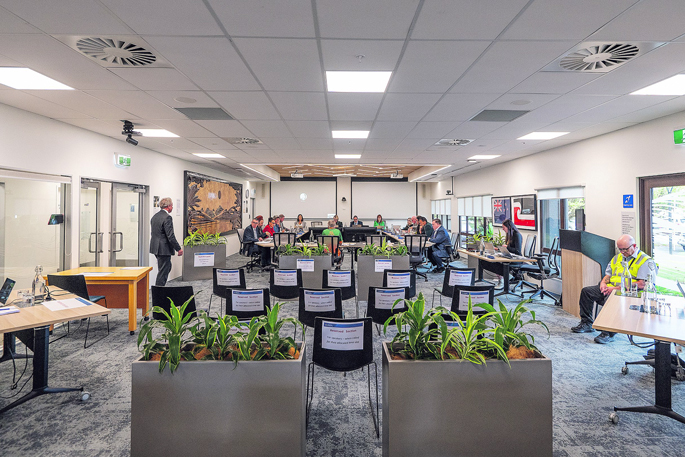Tension between those wanting better recreational facilities and those who consider three waters infrastucture a more pressing need was loud and clear during the first day of hearings for Whakatāne District Council’s Long-term Plan 2024-2034 on Thursday.
With more than 70 people and organisations wishing to speak at the hearing, two days and one evening was set aside for submissions.
Ake Acountants felt so strongly about the importance of sports to the community it made an offer to partner with the council to build a high performance sports facility for the town.
Chief executive and part owner of the local accounting firm, Tania-rose Tamati, spoke at length about the importance of sport to the wellbeing of the community.
“You may ask what an accounting firm has to do with sport. Our belief at Ake is that health, fitness and nutrition matters. Our number one passion is sport, not just because we love to play, coach and support, but because sport and recreation for us all is of huge importance holistically.”
She talked about the harm caused by inactivity the age of technology has caused, and the burden it puts on our health system.
“We also worry about the social mischief that occurs in the way of ram raids and car thefts because not all our rangitahi are able to release their endorphins in recreation and experience being in a positive and challenging team environment.”
She said the Eastern Bay produced some of the country’s most talented athletes but this was not something that was currently being nurtured.
While not being specific about how much financing the business was prepared to put toward the project, she said she welcomed the opportunity to discuss the proposal further with the council.
Whakatāne Marist Rugby Club chairman Matt Te Pou spoke in support of improved sports facilities, and to keep rugby fields in the current Rugby Park area.
He advocated for better parking, lighting for night games and seating as essential for a return to hosting provincial games as it once did.
“If you go past the grounds on a Saturday morning and see the soccer and rugby active, finding a car park is the biggest challenge.
“For a long time the park has screamed out for development beyond just rugby,” Mr Te Pou said.
Arts Whakatāne chairwoman Suzanne Whale advocated for a modern arts hub for the district, supporting the upgrade of the Rex Morpeth Recreation Hub and the Arts Strategy.
“As a frequent user of the War Memorial Complex I have personal knowledge of the state of this valuable community facility. There is mould, there are leaks; in particular, the Little Theatre is lacking in up-to-date technology.
“I experience water dripping dangerously on hot theatre lights and steam rising when working backstage in a school show. I also want to mention the antiquated and unsafe need to pull ropes from the fly floor, a gallery about six metres up for scene changes.”
Many, on the other hand, spoke on the need to stop spending on "fluffy non-essentials".
Edgecumbe organic dairy farmer Tom Richardson said the district's three-waters infrastructure was well past its use-by-date.
He said last year he spent 33 percent of his farm’s gross income on effluent systems upgrades to renew his consent.
“I didn’t have a choice. Why do you?
“Council use the excuse, ‘we can’t afford to fix these things’, but you can get electric cars and charging stations, refurbish the council building for millions of dollars, seal the end of Edgecumbe soldiers road when no residents wanted it or asked for it for half a million dollars. The reason given – ‘dust is dangerous to your health.”
John Howard and David Dowd spoke on behalf of the Whakatāne Action Group, a newly formed group with objections to some of the spending decisions the council has made.
“With reference to the Rex Morpeth Park development, our current economic climate surely must dictate that what we do is what is affordable now," Mr Howard said. "The original consultation was with hall users and was not widely known outside of that. How many of those people put their hands up to fundraise to meet some of the costs?
“While its great to see so many youth submissions ... it is also not them who are paying the bills yet. Our youth might be playing a different tune when they come to pay the debt in 10 years time.”
He felt that the 3 cents per week that the council said it would cost per ratepayer in the first year did not adequately represent the compounding effect on ratepayers in future years.
“The $6500 per rateable property for the redevelopment will be blown out by further cost increases, debt servicing and inflation and this is just one of the projects you will be putting up.”
LDR is local body journalism co-funded by RNZ and NZ On Air.




1 comment
Hmmm
Posted on 19-04-2024 18:59 | By Let's get real
It's sad to think that we might be heading towards an Aussie or American attitude towards sport.
It's a hobby or a pastime for most, with the vocal minority, once again, placing far more importance on a hobby than the necessities of life.
Maybe playing a game eases the worries of paying the bills, finding accommodation and putting food on the table for some. Those that have never heard of a housing shortage, cost of living increases and now redundancies.
I actually laughed at the report of an accountancy company wanting to sponsor the projects, presumably for their clients that need to use an accountant to manage their income for them.
How about getting the necessities sorted out as a PRIORITY before the nice to have vanity projects for the minority.
Leave a Comment
You must be logged in to make a comment.